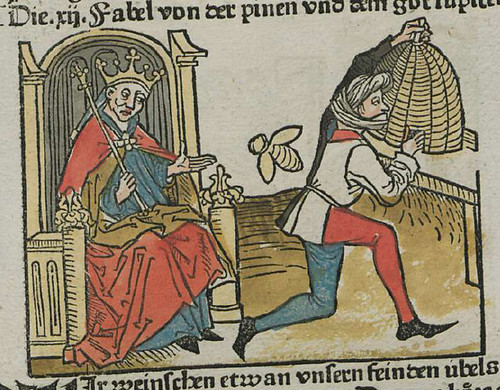HODIE: Kalendae Apriles, the Calends of April!
GOOGLE BOOKS: Today's Google Books are Girard's Stichostratia and Kochanowski's Dzieła wszystkie (this volume contains his Latin works).
MYTHS and LEGENDS: The art image for today's legend shows Nessus and Deianeira; you can also see the legends for the current week listed together here.

TODAY'S DISTICHS and EMBLEMS: All the distichs come with vocabulary lists!
RHYMING DISTICHS: The two new Rhyming Distichs are Cum soleant homini, Cum soleant homini feliciter omnia verti, / Maiori gravitate solent adversa reverti; and Vive Deo gratus, Vive Deo gratus, toti mundo tumulatus, / Pectore pacatus, semper transire paratus.
CATO'S DISTICHS: The two new Cato Distichs are Commoda naturae, Commoda naturae nullo tibi tempore derunt, / Si contentus eo fueris quod postulat usus; and Despice divitias, Despice divitias, si vis animo esse beatus; / Quas qui suspiciunt, mendicant semper avari.
MARTIAL'S DISTICHS: The two new Martial Distichs are Hostem cum fugeret, Hostem cum fugeret, se Fannius ipse peremit; / Hic, rogo, non furor est, ne moriare, mori? and Exigis ut nostros, Exigis ut nostros donem tibi, Tucca, libellos; / Non faciam: nam vis vendere, non legere.
VERINUS DISTICHS: The two new distichs by Verinus are Illa Patria est Felix, Illa domus felix, ubi parvo assueta iuventus; / In festo coctum luxuriatur olus; and Quomodo Dives Efficitur, Vis fieri dives? Christi praecepta sequaris; / Diminuas animi grandia vota tui.
OWEN'S DISTICHS: The two new Owen epigrams, with Harvey's English versions, are Adami Lapsus, Theilologis animam subiecit lapsus Adami, / Et corpus medicis, et bona iuridicis; and Corpus Terrae, Telluris lapides sunt ossa, metallaque nervi, / Pellis crusta, pili gramina, sanguis aqua.
ROLLENHAGEN'S EMBLEMS: The two new emblems are In Virtute Et Fortuna, In Virtute meam Fortunam colloco; vincam / Hac ratione nigram fortiter invidiam; and Suum Cuique Tribue, Cuique suum tribuat, poenas vel praemia, iudex, / lance pari ac aequis omnia ponderibus.
CAMERARIUS'S EMBLEMS: The two new emblems are Erit Altera Merces, Vincere pro patria, vel pulchra occumbere morte / Fortis amat: ramus quod monet iste duplex; and In Utrumque Paratus, Ferre iugum, iugulumque dare, est bos aptus utrinque, / Sic pia turba facit, grata Deo referens. Here you can see the ox, good for both the plow and the altar:

TODAY'S MOTTOES and PROVERBS:
TINY MOTTOES: Today's tiny motto is: Semper sursum (English: Always upwards).
3-WORD PROVERBS: Today's 3-word verb-less proverb is Malleus sapientior manubrio (English: The hammer is wiser than the handle)
AUDIO PROVERBS: Today's audio Latin proverb is Si satis est, multum est (English: If it is enough, it is a great deal). To read a brief essay about this proverb and to listen to the audio, visit the Latin Via Proverbs blog.
PUBLILIUS SYRUS: Today's proverb from Publilius Syrus is: Semper consilium tunc deest, cum opus est maxime (English: There is always a lack of good advice when it is most needed).
ERASMUS' ANIMALS: Today's animal proverb from Erasmus is Ut canis e Nilo (English: Like a dog drinking from the Nile; from Adagia 1.9.80 - an allusion to the famous Aesop's fable about the dog and the crocodile).
TODAY'S FABLES and STORIES:
ANECDOTE OF THE DAY: Today's anecdote is Tarpeia, the story of one of Rome's most famous traitors.
FABULAE FACILES WIDGET: The fable from the Fabulae Faciles widget is Simia et Piscatores, the story of a monkey who wanted to be a fisherman (this fable has a vocabulary list).
MILLE FABULAE WIDGET: The fable from the Mille Fabulae et Una widget is Harundo et Quercus, a story about being flexible.
AESOP IN ENGLISH VERSE: Today's fable from the English verse widget is The Mouse that Fell into the Pot, a story about a mouse's last meal.
MILLE FABULAE: The "chunk" of Mille Fabulae et Una today is Fable 661, Scorpio et Iuvenis, through Fable 670, Apes et Iuppiter, the story of how the bees got their sting: Quod suos labores ab hominibus compilari apicula aegre ferret, elegantissime constructos favos Iovi obtulit et ab illo petiit letiferam ut aculeo suo vim adderet. Iuppiter, immanitate bestiolae offensus, “Immo potius vitalem vim tribuam,” inquit, “ut una cum illo tibi vita relinquenda sit.”
